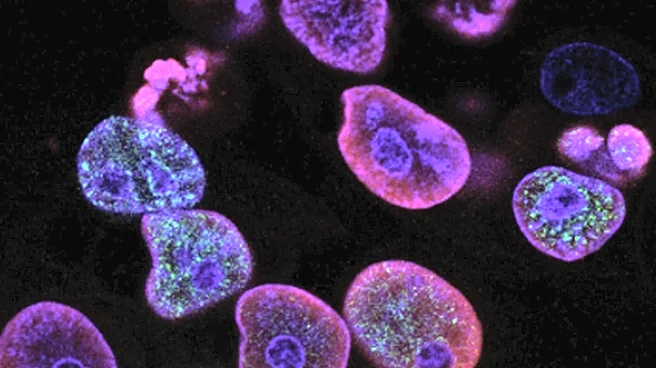What's Happening?
Recent research has delved into the pathogenic role of Th17 cells in autoimmune diseases. Th17 cells, a subset of T cells, are known for their role in protecting against bacterial and fungal infections. However, they also contribute to the pathogenesis of autoimmune diseases by producing pro-inflammatory cytokines such as IL-17A, IL-17F, and IL-22. The differentiation and function of Th17 cells are influenced by various cytokines, including IL-6, IL-21, and TGF-β, which modulate their pathogenic potential. The study highlights the complex interplay of intrinsic and extrinsic factors that dictate Th17 cell behavior, emphasizing the importance of cytokine signaling pathways and transcription factors in their differentiation and pathogenicity.
Why It's Important?
Understanding the mechanisms behind Th17 cell differentiation and pathogenicity is crucial for developing targeted therapies for autoimmune diseases. Th17 cells are implicated in conditions such as multiple sclerosis, rheumatoid arthritis, and inflammatory bowel disease. By elucidating the signaling pathways and transcription factors involved in Th17 cell differentiation, researchers can identify potential therapeutic targets to modulate their activity. This could lead to the development of treatments that specifically inhibit the pathogenic functions of Th17 cells without compromising their protective roles, offering new hope for patients with autoimmune disorders.
What's Next?
Future research will likely focus on further dissecting the molecular pathways that regulate Th17 cell differentiation and function. This includes exploring the role of non-coding RNAs and metabolic pathways in Th17 cell biology. Additionally, clinical trials may be conducted to test new therapeutic agents targeting Th17 cells or their signaling pathways. Understanding the environmental and physiological factors that influence Th17 cell behavior, such as gut microbiota and dietary components, could also provide insights into lifestyle interventions that may mitigate autoimmune disease symptoms.
Beyond the Headlines
The study of Th17 cells also raises ethical and cultural considerations, particularly in the context of personalized medicine. As researchers develop therapies targeting specific immune pathways, questions about accessibility, cost, and equitable distribution of these treatments will need to be addressed. Furthermore, understanding the role of environmental factors in Th17 cell regulation may lead to public health initiatives aimed at preventing autoimmune diseases through lifestyle modifications.










